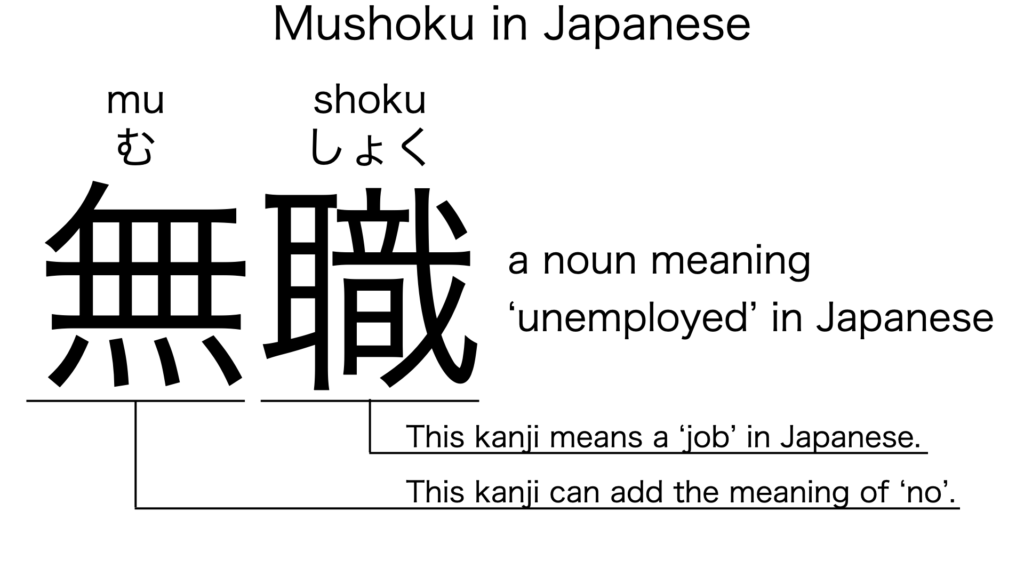What does “mushoku” mean in Japanese?
There are homophones, but native speakers use mushoku often to refer to the state of being unemployed in Japanese. Perhaps, some Japanese learners know this word as it is sometimes used in Japanese conversations. In this blog post, however, I’m explaining this word in detail based on its kanji expression. And also, I’m explaining how to use it through example sentences. My explanations would help Japanese learners understand mushoku more clearly. Then, let’s get started!
Contents
Definition and meanings of “mushoku”
Let me start with the definition and meanings of mushoku.
- mushoku – 無職 (むしょく) : a noun used to refer to the state of being unemployed in Japanese. This can also refer to a person or people with no job. So, this can mean ‘unemployed’ or ‘the unemployed’ in Japanese.
The definition and meanings are not that difficult, I think. To understand this noun more clearly, however, let me explain its kanji characters in detail, one by one.
Mushoku in kanji
The kanji expression of mushoku consists of the following two kanji characters:
- 無 : a kanji character often used as a prefix or suffix to deny the meaning of the word used together.
- 職 : a kanji character often used to mean a ‘job’ in Japanese.
From these two kanji characters, we can understand that mushoku literally means ‘no job’ in Japanese. This literal interpretation is very close to the actual meanings. Indeed, the state of being unemployed is the state of having no job.

When we meet new kanji expressions, we should check their kanji characters in detail to understand their meanings clearly and deeply. In many cases, kanji characters tell us a lot about the meanings of the expressions they form. Actually, here, we could get the better understanding of mushoku through the detailed check above.
So far, I’ve explained the definition and meanings of mushoku together with its kanji characters. Then, let me explain how to use it through the example sentences below.
How to say “unemployed” in Japanese
watashi tachi wa mushoku desu – 私達は無職です (わたしたちはむしょくです)
We are unemployed.
Below are the new words used in the example sentence.
- watashi – 私 (わたし) : a pronoun meaning ‘I’ in Japanese.
- tachi – 達 (たち) : a suffix used after a noun or pronoun to make its plural form. In the example, this is used after watashi to make its plural form, watashi tachi, which means ‘we’ in Japanese.
- wa – は : a binding particle working as a case marker or topic marker. In the example, this works after watashi tachi to make the subject in the sentence.
- desu – です : an auxiliary verb used after a noun or adjective to make it polite. Probably, this is well known as a part of the Japanese desu form. In the example, this is used after mushoku to make it sound polite.
This is a typical usage of mushoku. In this example, it works as the complement in the sentence and means ‘unemployed’ in Japanese.
Another example of “mushoku”
boku mo mushoku ni nari tai – 僕も無職になりたい (ぼくもむしょくになりたい)
I want to be unemployed, too.
Below are the new words used in the example sentence.
- boku – 僕 (ぼく) : a pronoun meaning ‘I’ in Japanese. This is used mainly by boys and young males.
- mo – も : a binding particle making the subject word or the object word in a sentence with adding the meaning of ‘too’, ‘also’, or ‘as well’. In the example, this works after boku to make the subject in the sentence with adding the meaning of ‘too’.
- ni – に : a case particle used to say what someone or something becomes after a change or action. In the example, this is used after mushoku to say what the speaker wants to be.
- nari – なり : one conjugation of the verb, naru, which means ‘to become’, ‘to get’, ‘to turn’, or just ‘to be’ in Japanese. In the example, it has been conjugated for the better connection with its following word.
- tai – たい : an auxiliary verb used after a verb to make its desire form. Probably, this is well known as a part of the Japanese tai form. In the example, this is used after nari to make its desire form, nari tai, which means ‘to want to be’ in Japanese.
This is another example of mushoku. In this example, it works as a part of the commonly-used phrase, mushoku ni nari tai, which literally means ‘to want to be unemployed’ in Japanese. This phrase perhaps implies the existence of a strong desire to be free from employers.
Summary
In this blog post, I’ve explained the definition and meanings of mushoku in detail based on its kanji expression. And also, I’ve explained how to use it through the example sentences. Let me summarize them as follows.
- mushoku – 無職 (むしょく) : a noun used to refer to the state of being unemployed in Japanese. This can also refer to a person or people with no job. So, this can mean ‘unemployed’ or ‘the unemployed’ in Japanese. These two kanji characters literally mean ‘no job’ in Japanese. This literal interpretation is very close to the actual meanings. Indeed, the state of being unemployed is the state of having no job.
Hope my explanations are understandable and helpful for Japanese learners.
Leave a Reply